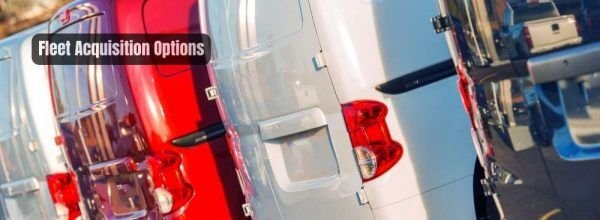In business, the road to success is often paved with important decisions. One of the most significant choices a company can make is how to acquire and manage its fleet of vehicles. Fleet acquisition is a pivotal moment that can impact your bottom line, brand image, and operational efficiency. But don’t fret – you’re not alone in this journey. In this blog post, I will draw upon a decade of experience in fleet management to help you navigate the intricate world of fleet acquisition.
Fleet Acquisition Options
With a clear understanding of your fleet’s size and composition, the next step is to explore various vehicle acquisition options. Each option comes with its advantages and considerations, so let’s delve into them:

Buying new vs. used vehicles
Buying new or used vehicles can significantly impact your initial costs, ongoing expenses, and long-term fleet management. Consider the pros and cons of each:
Buying New Vehicles
- Pros:
- Warranty: New vehicles typically come with warranties, reducing the financial burden of unexpected repairs during the initial years.
- Latest Technology: New vehicles often feature advanced safety, fuel efficiency, and technology enhancements.
- Lower Maintenance: New vehicles require less maintenance early in their lifespan.
- Cons:
- Higher Initial Costs: Purchasing new vehicles involves a more substantial upfront investment, which may strain your budget.
- Depreciation: New vehicles lose value quickly in the first few years, affecting their resale value.
- Example: A growing e-commerce business in Munich may opt for new delivery vans to ensure reliability and take advantage of the latest delivery tracking technology.
Buying Used Vehicles
- Pros:
- Lower Initial Costs: Used vehicles are more budget-friendly, allowing you to acquire a more extensive fleet with the same budget.
- Depreciation: The depreciation rate on used vehicles is lower than that of new cars.
- Proven Reliability: You can research the history and performance of specific used vehicles, reducing the risk of unexpected issues.
- Cons:
- Maintenance Needs: Used vehicles may require more frequent maintenance and repairs.
- Limited Warranty: The warranty period on used vehicles may have expired, increasing repair costs.
- Example: A startup in Hamburg with limited capital might choose used cars for their sales team, enabling them to expand their fleet cost-effectively.
Essential Service For Buyers: Pre-purchase inspection
Pre-purchase inspection (PPI) is changing the way we buy pre-owned vehicles. Watch this video and see why it is a game-changer.
Leasing options
Leasing offers flexibility and can be an attractive option for businesses looking to manage their cash flow and stay up-to-date with vehicle technology:
Operating Lease
- Pros:
- Lower Monthly Payments: Monthly lease payments are typically lower than loan payments when buying a new vehicle.
- Regular Upgrades: You can lease newer vehicles every few years, benefiting from improved technology and efficiency.
- Maintenance Packages: Some leases include maintenance packages, reducing operational hassles.
- Cons:
- No Ownership: You don’t own the vehicle at the end of the lease term, which means no resale value.
- Mileage Limits: Leases often come with mileage restrictions, and exceeding them incurs additional charges.
- Contract Penalties: Terminating a lease early may result in penalties.
- Example: A marketing agency in Berlin may opt for operating leases for their creative team’s vehicles, ensuring they always have the latest models to impress clients.
Finance Lease
- Pros:
- Ownership Option: You can purchase the vehicle at the end of the lease term at a predetermined price.
- Fixed Monthly Costs: Monthly payments remain consistent throughout the lease term.
- Tax Benefits: In some cases, finance leases offer tax advantages for businesses.
- Cons:
- Higher Monthly Payments: Monthly payments for finance leases may be higher than for operating leases.
- Residual Value Risk: You bear the risk of the vehicle’s future resale value.
- Maintenance Responsibility: Maintenance and repairs are typically the lessee’s responsibility.
- Example: A logistics company in Frankfurt might choose finance leases for its long-haul trucks, as they intend to own the vehicles eventually.
Fleet management services
Fleet management services can be a game-changer for businesses looking to streamline their operations and focus on core activities:
Pros:
- Expertise: Fleet management companies are experts in the field, ensuring your vehicles are well-maintained and managed efficiently.
- Cost Efficiency: These services often provide cost-effective maintenance and repair solutions.
- Data Insights: Fleet management services can offer valuable data and analytics to optimize routes and reduce fuel consumption.
Cons:
- Service Costs: Fleet management services come with service fees, which may impact your budget.
- Loss of Control: You relinquish some control over day-to-day fleet operations to the service provider.
- Service Quality: The quality of service may vary depending on the provider.
- Example: A pharmaceutical distribution company operating in Munich might partner with a fleet management service to ensure its product’s safe and timely delivery while focusing on its core business activities.
Buying new or used, leasing, or utilizing fleet management services should align with your business goals, budget, and long-term strategy. Each option has its merits, and the decision will depend on your unique circumstances.
Conclusion
In fleet acquisition, making informed decisions can be the difference between cruising smoothly and hitting roadblocks. Whether contemplating the new vs. used conundrum or weighing the merits of leasing, this blog post has armed you with essential insights.
Remember, your fleet is not just a collection of vehicles. It’s a vital asset that drives your business forward. With the knowledge gained here, you’re ready to steer your fleet acquisition toward success. Safe travels on your journey to a more efficient and cost-effective fleet!
Fleet Related Topics:
How To Manage Your Fleet Budget Effectively And Save Money
Fleet Sizing And Composition: Best Practices For Your Business
Fleet Operations: 10 Easy Ways To Reduce The Operating Costs
